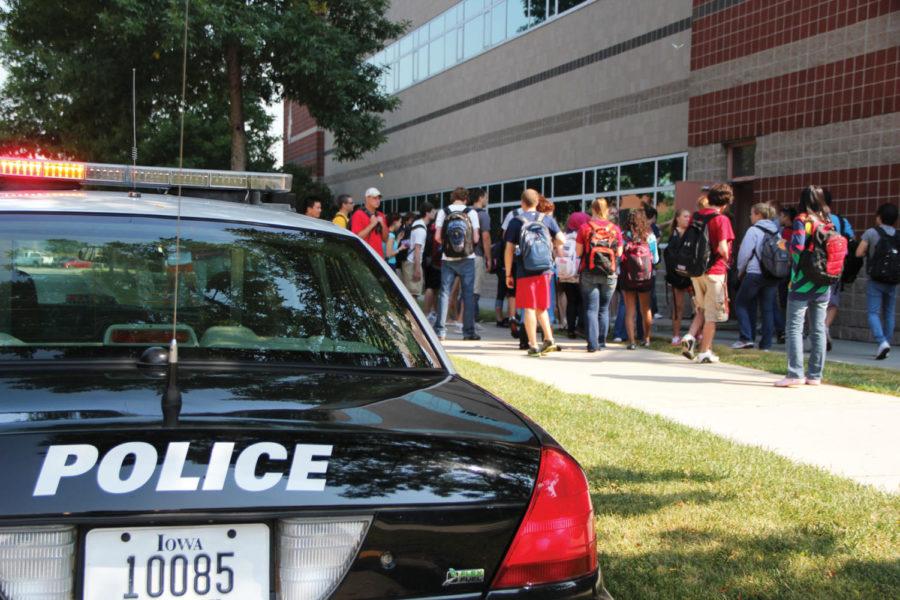Belding: Law enforcement should be done by actual people, not by cameras
Photo: Emily Harmon/ Iowa State Daily
On Wednesday, Aug. 30, students wait outside the Molecular Biology building as the police check out a pulled fire alarm.
March 26, 2012
Life under tyranny is hardly a life at all. This principle is illustrated by the state motto of New Hampshire, “Live Free or Die,” and one of the most well-known declarations from the lead-up to the American Revolution, Patrick Henry’s “Give me liberty, or give me death.”
Although it is hyperbolic to compare the use of red-light and speeding cameras in favor of actual law enforcement officers enforcing laws to tyranny, the issue is an issue of importance where political liberties are concerned.
Some of the most controversial actions in Iowa politics over the past two years have come from freshman tea party Republican legislators elected in 2010. This time, however, they have done a good thing. Last week a House committee passed a bill prohibiting the use of “automated traffic law enforcement systems” (red-light and speeding cameras), which is now available for debate by the whole House.
The effect of that law would be to forbid and end the use of cameras that enforce red stoplights and speeding laws. While it is convenient for cities to install such cameras at their intersections to cut down on personnel costs and keep the peace by exerting minimal effort — for example, between August 2011 and December 2011, the city of Des Moines netted just more than $375,000 — the automation of law enforcement and bureaucracy only worsens the distinction between people and government.
A republic such as ours is not supposed to be merely “government of the people” and “for the people.” In his classic definition of the American political system, President Abraham Lincoln included “government by the people” when he spoke at Gettysburg in 1863.
The whole point of a republic is that the people are the government. In the ancient world, rotation in office was a hallmark of any democratic or republican system. Many city-states determined who held what offices by casting lots. Citizenship was — and should still be — defined by participation in the public world, and each resident able to transcend his own private needs had an opportunity to participate.
It may not be possible for us all to participate in the republican ideal of rotation in office, and indeed most Americans seem apathetic and unwilling to tune in to the news, form an opinion, discuss it amongst themselves, vote in elections and even stand for office. Nonetheless, one thing we can do is prevent the government from taking advantage of that apathetic and complacent attitude.
Impersonal law enforcement is a dangerous game. Without living police officers who must exercise judgment, whom an accused may face — one of the cornerstones of criminal procedure, protected by the Bill of Rights — government becomes even more removed from the people. Without requiring police officers to pull over offending drivers themselves, legislatures — the people themselves — allow guilt and the subsequent fines to become foregone conclusions.
Traffic cameras are machines. And, like every other machine to have existed, they fall out of calibration, wear out and otherwise become unable to function properly. They have no ability to recognize context or circumstances, have no ability to investigate and make decisions based on an entire situation and cannot make split-second judgment calls.
I do not think it is very necessary to ask how many of you have been pulled over by a police officer, and sometime between his or her arrival at your car window and his or her final return to the police car, that officer has exercised some kind of discretion, and higher or lower, has adjusted the fine you then have to pay or the citation you receive.
All parts of the political process, including law enforcement, are about discretion. A police officer on duty at midnight in Huxley, for instance, might pull over a 22-year-old driving a Ford Mustang for going five miles per hour over the limit. He might then, upon seeing that the driver seems like an honest kid, decide to let him go without issuing a citation because he “has bigger fish to fry” that night. Or, if the driver is an arrogant kid with no respect for authority, the officer might give him a ticket to drive home the idea that speed limits are important.
Relying on individual people who go home at the end of the day to enforce laws makes governments more accountable to the citizens they are supposed to serve and protect. When a piece of equipment rather than a person charges you with a crime, even one as miniscule as running a red light or speeding, there is a less-than-standard opportunity to influence the legal process as it pertains to you. Political freedom requires that the agents of government be approachable and be drawn from the mass of ordinary citizens.

















